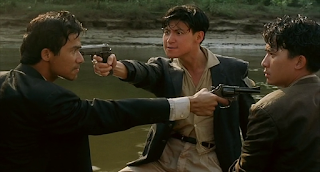Samurai Marathon; or, What Samurai Talk When They Talk About Running
If there is a turbulence in the atmosphere, you need to report immediately back to us. Have no hesitation... And don't be found by others.
Samurai Marathon is the latest jidaigeki, directed by
Bernard Rose and based on a 2014 novel by Akihiro Dobashi. This period picture
focuses on the origins of marathons in Japan at the end of the Edo period.
Release Info
Directed by: Bernard Rose Starring: Takeru Sato, Nana Komatsu, Mirai Moriyama, Shota Sometami
Language: Japanese Original Title: サムライマラソン Runtime: 104 min
Synopsis
When
American troops led by Commodore Perry (Danny Huston) arrive at the Japanese shoreline, this causes
quite a commotion among the officials. Local leaders are afraid of potential attacks
from foreign invaders and, one of them, Lord Itakura (Hiroki Hasegawa), announces a 60-kilometre
marathon contest in order to strengthen his samurai. One of the loyal warriors,
Jinnai Karasawa (Takeru Sato), is actually a spy working for the shogunate. Jinnai
misinterprets his lord’s intention as a call to arms and sends a wrong message
to the capital. As a result of this, a
squad of assassins is dispatched in order to suppress the presumed uprising.
The Hidden Blades
Samurai Marathon may have a bit of a confusing introduction in
view of many characters and plotlines interwoven with each other, but the
further the film goes, the better it gets. The story greatly reminded me about
such classics as Hideo Gosha’s Three Outlaw Samurai (1964) and Kihachi Okamoto’s
Kill! (1968). There are multiple perspectives focusing on the characters who
participate in the marathon. Eventually, everything comes together when the
assassins arrive and the samurai have to race against time to save Lord
Itakura.
Additional advantage is the beautiful cinematography done by Takuro
Ishikaza. The atmospheric forest setting and smooth camera work really evoke
early films of Akira Kurosawa. Also, the music score composed by Phillip Glass
gives a breath of fresh air and emphasises the gravity of the difficult
situation the samurai have found themselves in.
The all-star cast cannot go unnoticed as well. Takeru
Sato’s portrayal of a conflicted samurai became his second nature (*Rurouni Kenshin flashbacks*). His performance is aided by those of Nana Komatsu, Shota
Sometami, and Mirai Moriyama in supporting roles. Surprisingly, Naoto
Takenaka has a small but great part as a retired mentor.
Recommendations
If you like historical movies, then you can safely check out
Samurai Marathon. It is a well-made drama which provides nods to the golden age
of samurai flicks. It will certainly keep you entertained. I wish more historical dramas like that could be made nowadays.
Overall score: 8/10






















